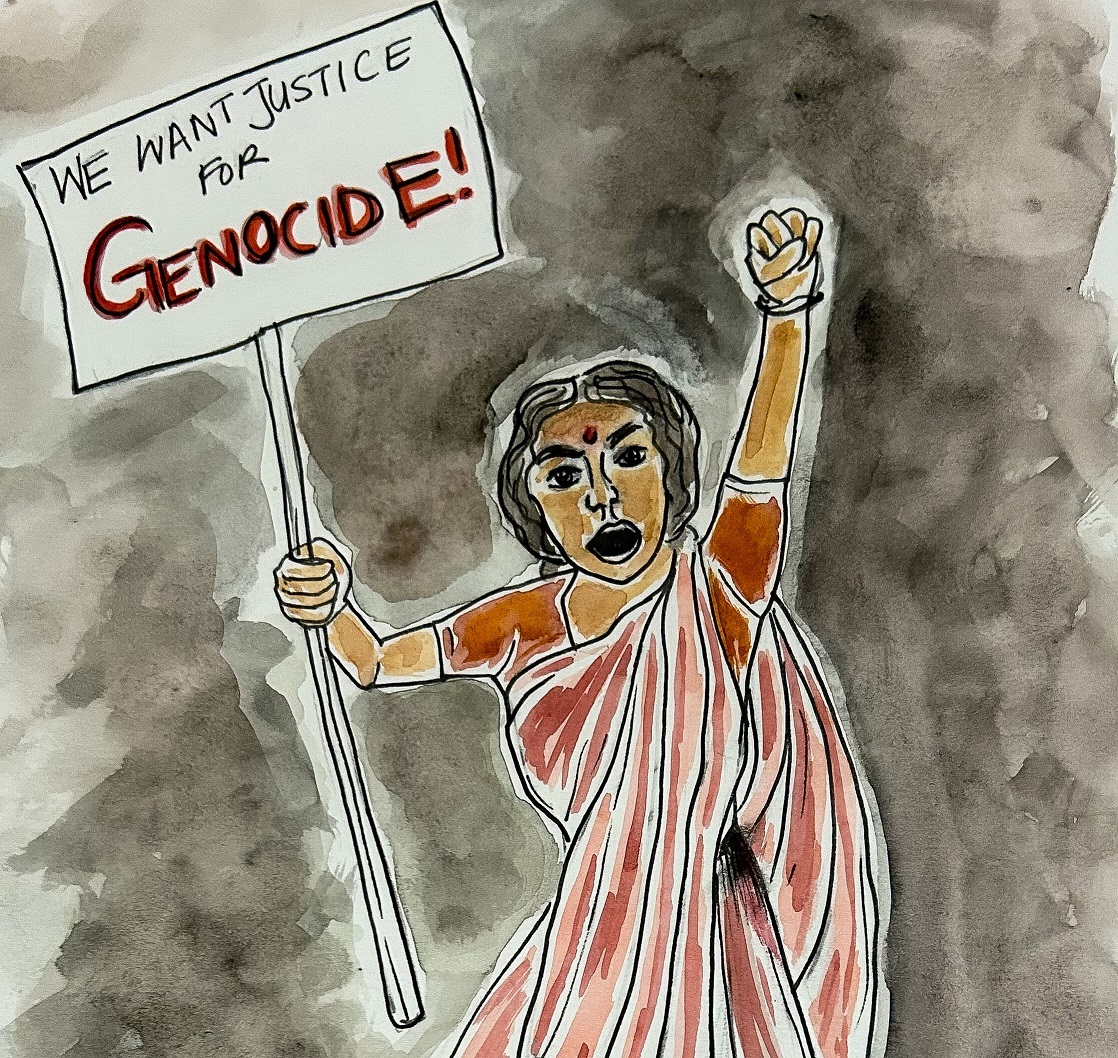
This week, the draft text of a new resolution on Sri Lanka was circulated as the United Nations Human Rights Council (UNHRC) currently hosts its 57th session in Geneva. The resolution proposes extending the mandate of the Office of the High Commissioner for Human Rights for another year to continue to “collect, consolidate, analyse and preserve” evidence that may be used in future war crimes trials. After years of waiting for concrete action from the global body, the victims of Sri Lanka’s genocide will be left feeling bitterly disappointed.

Illustration by Keera Ratnam / wavesofcolour
This week, the draft text of a new resolution on Sri Lanka was circulated as the United Nations Human Rights Council (UNHRC) currently hosts its 57th session in Geneva. The resolution proposes extending the mandate of the Office of the High Commissioner for Human Rights for another year to continue to “collect, consolidate, analyse and preserve” evidence that may be used in future war crimes trials. After years of waiting for concrete action from the global body, the victims of Sri Lanka’s genocide will be left feeling bitterly disappointed.
In response to the High Commissioner’s damning report last week, Sri Lanka reminded the Council that it had already rejected the previous resolution from the outset. Colombo claimed that the external evidence gathering mechanism is “unproductive and unwarranted”, instead touting its domestic initiatives - all of which have been rejected by those hardest hit by its history of repression. The Tamil families of the disappeared, for example, have long condemned Sri Lanka’s domestic institutions for their failure to investigate enforced disappearances and prosecute Sri Lankan war criminals. Despites decades of similar commissions, inquiries and offices, their questions over the fate of their loved ones remain unanswered.
As Colombo itself highlighted, its opposition to resolutions from the world’s apex human rights body is not new. Indeed, multiple regimes have for years refused to comply with any form of international accountability mechanisms or meet the obligations set forth in UNHRC resolutions. Faced with such obstinance, the decision to simply ‘roll over’ the resolution for a further year sends a message that failing to meet universally recognised human rights norms will only face the weakest of reprimands. It seems that there will be no escalation in international action. And impunity will simply continue to dominate Sri Lanka.
Tamil victim-survivors have already grown wary of the UN Human RIghts Council. For several years now they have earnestly engaged with the United Nations processes, with regular visits to Geneva, multiple meetings with diplomats, dozens of well-attended side events and impassioned addresses directly on the Council floor. More than 15 years have now passed since the genocide at Mullivaikkal. But Sri Lankan war criminals continue to roam free, the North-East continues to be blighted by ongoing militarisation, Tamil lands and places of worship continue to be grabbed and the fate of the forcibly disappeared remains unknown. The anger at the lack of progress on past violations, combined with the continued suffocation they face at the hands of Colombo, is palpable. Tamil frustration is growing.
Sri Lanka’s outright rejection of international justice for atrocity crimes does however highlight the limitations of the UN Human Rights Council. In his last report, the High Commissioner encouraged member states to fill the “accountability gap” by pursuing other avenues for accountability, such as referring Sri Lanka to the International Criminal Court (ICC). The High Commissioner recommended in 2022 and again in his latest report that member states also use the principle of universal jurisdiction to target war criminals in their own courts, and individual sanctions on human rights abusers. Yet, little action has been taken by member states to date.
With Sri Lanka's presidential elections on the horizon, and Sinhala candidates refusing to address accountability—many even courting war criminals—the international community must send a strong message to all in Colombo. Genocide cannot be forgotten and injustice cannot simply be erased. The international community cannot just roll over.
